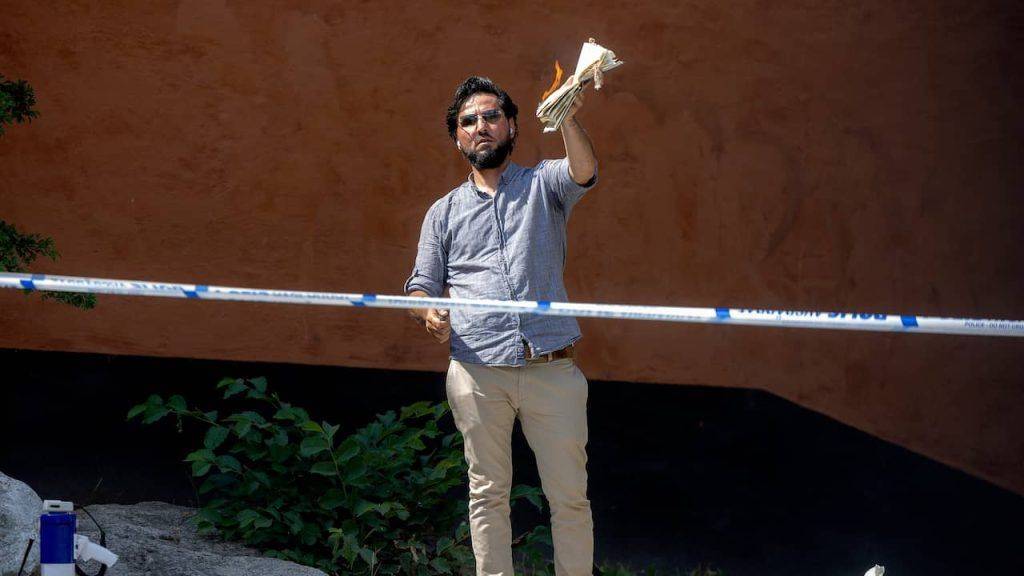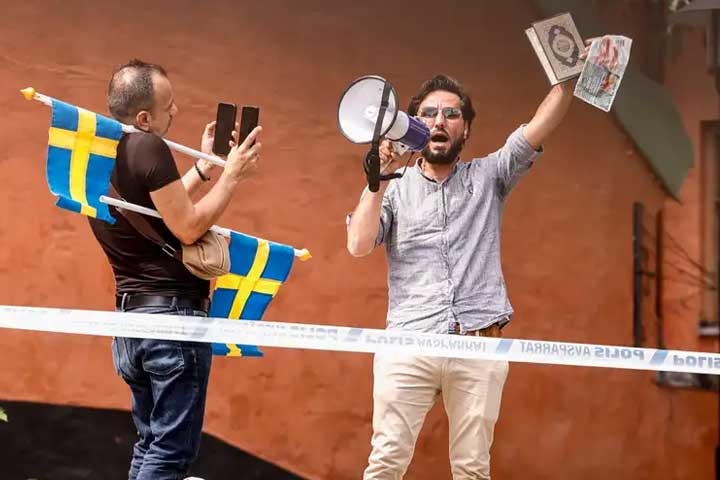In the heart of Sweden’s bustling capital, Stockholm, a controversial event unfolded that sent shockwaves around the world. The central figure of this incident, Salwan Momika, a 37-year-old Iraqi refugee turned Swedish citizen, has become a topic of heated discussion globally.
Known for his audacious act of burning the Quran outside Stockholm’s largest mosque, Momika has ignited a debate on the boundaries of freedom of speech and religious tolerance. In this article we will dive into the life of Salwan Momika, his motivations, and the repercussions of his provocative act.
Background of Salwan Momika
Salwan Momika’s Origin and Migration to Sweden
- Salwan Momika, born as Salwan Sabah Matti Momika, is an Iraqi national who made a life-altering decision to leave his homeland and seek refuge in Sweden.
- His journey from Iraq to Sweden was driven by circumstances yet to be fully disclosed, but it’s clear that his arrival in Sweden marked a significant turning point in his life.
His Life in Sweden
- Upon his arrival in Sweden, Momika settled in the municipality of Järna in Södertälje, Stockholm County.
- He has been living in this region for a couple of years, leading a life that remained relatively unnoticed until the controversial incident that thrust him into the global spotlight.
- Despite the controversy surrounding him, Momika has managed to maintain a low profile about his personal life and activities in Sweden.
His Religious Beliefs and Identification as an Atheist
- A significant aspect of Momika’s identity is his religious beliefs, or rather, the lack thereof.
- Despite his Iraqi origins, a country with a significant Muslim population, Momika identifies himself as an atheist.
- His atheistic beliefs played a crucial role in his decision to burn the Quran, an act that he justified as an expression of his opinion about the Islamic religious text.
- His actions and statements have made it clear that he is not just a non-believer but also an active critic of the Islamic faith.
The Incident
Detailed Account of the Quran Burning Incident
- The incident that catapulted Salwan Momika into the global spotlight was his public burning of the Quran, the holy book of Islam.
- This act took place outside Stockholm’s central mosque, where Momika, with a permit to protest from the Swedish police, stomped on the Islamic holy book and set several pages alight.
- The act was not just a symbolic gesture; it was a deliberate and calculated move that Momika had planned and sought permission for.
- Despite the controversy and potential legal repercussions, Momika went ahead with his plan, sparking a wave of reactions both within Sweden and internationally.
Role of Another Protester Who Translated Remarks of Salwan Momika
- Momika was not alone during this incident. Another protester was present at the scene, translating Momika’s remarks for the crowd and the media.
- This individual played a crucial role in ensuring that Momika’s message was clearly communicated and understood by those present.
- The identity of this protester and their relationship with Momika remain undisclosed, but their presence and role in the incident underscore the organized nature of the protest.
Timing of the Incident – During Eid al-Adha Celebrations
- The timing of the Quran burning incident was no coincidence. It took place during the Muslim festival of Eid al-Adha, also known as Bakrid.
- This festival is one of the most important in the Islamic calendar, marking the end of the annual pilgrimage to Mecca in Saudi Arabia.
- By choosing this particular day for his protest, Momika ensured maximum visibility and impact, further intensifying the controversy surrounding his actions.
Motivation and Intentions of Salwan Momika
Momika’s Stated Motivations for the Act
- Momika’s motivations for the Quran burning incident were rooted in his personal beliefs and views on Islam.
- He stated that his intention was to protest against the Muslim religion, rather than to protest against Sweden joining NATO.
- Despite the backlash and threats he received, Momika remained steadfast in his motivations, stating that he was not fighting against Muslims, but against their thoughts.
His Views on Freedom of Speech and Democracy
- A significant aspect of Momika’s motivations was his strong belief in freedom of speech and democracy.
- He viewed his act of burning the Quran as an exercise of his democratic rights and a demonstration of freedom of speech.
- Before carrying out the act on afternoon of June 28th, he was quoted as saying, “We are going to burn the Quran. We are going to say ‘wake up Sweden. This is democracy and it will be in danger if they say we can’t do it’. We are not fighting against Muslims, but against their thoughts. We are not against Muslims, we are on their side”.
- His actions and statements highlight his conviction that freedom of speech should allow for criticism and rejection of religious texts and beliefs.
His Call for the Quran to be Banned
- Beyond his act of burning the Quran, Momika also called for the Quran to be banned.
- He expressed his view that the Islamic holy book promotes harmful ideologies and should therefore not be allowed.
- His call for the Quran to be banned is a controversial stance that has added to the debate around his actions and the limits of freedom of speech.
His full name is Salwan Sabah Matti Momika, he’s a 37 year old Iraqi living in Järna, on Bergsgatan 4 A street to be exact, and he moved there 2 years ago. He lives in the municipality of Södertälje, Stockholm County.
— عمر العجوز (@lakarstudent0) June 28, 2023
Disclaimer: All of this is public information!
1/3 https://t.co/jOZOY5yUhq pic.twitter.com/gnv2RDugpy
Legal Aspects
The Swedish Court’s Decision to Permit the Demonstration
- In a move that stirred controversy, the Swedish court granted permission for Momika’s demonstration.
- This decision was based on Sweden’s commitment to uphold the principles of freedom of speech and expression.
- However, the court’s decision was met with criticism, with many arguing that it allowed for an act of hate speech to take place.
The Police’s Refusal to Authorize the Quran Burnings
- Despite the court’s decision, the Stockholm police refused to authorize the Quran burnings.
- The police cited security concerns and the potential for the act to incite violence and hatred.
- This refusal highlighted the tension between the principles of freedom of speech and the need to maintain public order and respect for religious beliefs.
The Subsequent Police Investigation into the Incident
- Following the Quran burning incident, the police opened an investigation into Momika’s actions.
- The investigation focused on whether Momika’s act constituted “agitation against an ethnic group”, given its proximity to the mosque and the timing during Eid al-Adha celebrations.
- Momika denied that his actions constituted a hate crime, stating that it would be up to a court to decide in the end. This ongoing legal process adds another layer to the complex and controversial story of Salwan Momika.
Reactions and Consequences
Public and International Reactions to the Incident
- The Quran burning incident sparked a wave of reactions both within Sweden and internationally.
- Swedish Prime Minister Ulf Kristersson described the act as “legal but inappropriate”.
- Public opinion was divided, with some supporting Momika’s right to freedom of speech, while others condemned his actions as an act of hate speech.
- Internationally, the incident drew widespread condemnation, particularly from Muslim-majority countries. It also sparked protests and calls for a boycott of Swedish goods.
Death Threats Received by Salwan Momika
- In the aftermath of the incident, Momika reported receiving several death threats.
- Despite the threats, he remained defiant, stating his intention to continue his protests in defense of his freedom of speech and expression.
- The threats against Momika underscore the high tensions and potential for violence that his actions have stirred.
The Impact on Sweden’s Relations with Other Countries
- The incident had significant diplomatic repercussions for Sweden, particularly in its relations with Muslim-majority countries. Some countries like Morocco even recalled their ambassador to Stockholm.
- It led to calls for a boycott of Swedish goods and further stalled Sweden’s NATO membership bid, which is being blocked by Ankara.
- “It is unacceptable to allow these anti-Islamic actions under the pretext of freedom of expression. To turn a blind eye to such heinous acts is to be complicit in them,” Hakan Fidan (Minister of Foreign Affairs of Turkey) said in a statement.
- The incident has put Sweden in a difficult position, as it tries to balance its commitment to freedom of speech with the need to maintain good diplomatic relations with other countries.
Future Plans of Salwan Momika
Plans of Salwan Momika for Further Protests
- Despite the controversy and backlash surrounding his Quran burning incident, Momika has expressed his intention to continue his protests.
- He remains committed to his cause, undeterred by the death threats and legal repercussions he has faced.
- His future plans indicate a determination to continue expressing his views on Islam and the Quran, regardless of the potential consequences.
His Intention to Burn the Iraqi Flag and the Quran Outside the Iraqi Embassy
- As part of his future protests, Momika has stated his intention to burn the Iraqi flag and the Quran outside the Iraqi embassy in Stockholm.
- This planned act is a clear indication of his continued criticism of Islam and his rejection of his Iraqi heritage.
- The potential for further controversy and backlash is high, as this act would not only be seen as an attack on Islam but also a direct affront to the nation of Iraq.
Broader Context
The History of Quran Burning Incidents in Sweden
- The act of burning the Quran is not a new phenomenon in Sweden. The country has witnessed similar incidents in the past, sparking debates about freedom of speech and religious tolerance.
- These incidents have often been associated with anti-Islam sentiments and have led to public protests and international condemnation.
- The recurring nature of these incidents highlights the ongoing tensions within Swedish society regarding Islam and the country’s Muslim population.
The Role of Rasmus Paludan, a Danish-Swedish Politician Known for Similar Acts

- Rasmus Paludan, a Danish-Swedish politician, has been a notable figure associated with Quran burning incidents in Sweden.
- Known for his anti-Islam stance, Paludan has carried out similar acts in the past, leading to public outrage and legal consequences.
- The actions of figures like Paludan and Momika underscore the presence of anti-Islam sentiments within certain sections of Swedish society.
The Issue of Integration of Immigrants in Sweden
- The incident involving Momika also brings to light the broader issue of the integration of immigrants in Sweden.
- As an Iraqi refugee turned Swedish citizen, Momika’s actions raise questions about the experiences and challenges faced by immigrants in Sweden.
- His controversial act and the reactions it elicited highlight the complexities of cultural and religious integration in a diverse society like Sweden.
Conclusion
In conclusion, the story of Salwan Momika serves as a stark reminder of the complexities and challenges that arise when freedom of speech, religious tolerance, and cultural integration intersect.
His actions and the subsequent reactions have sparked a global conversation about the limits of free speech and the respect for religious beliefs. As we continue to grapple with these issues, it’s crucial to foster dialogue and understanding among diverse communities.
If you found this article insightful, we encourage you to share it with others. By doing so, you can help promote a more informed and nuanced discussion about these important topics.
FAQs on Salwan Momika
Salwan Momika is a 37-year-old Iraqi refugee who migrated to Sweden. He came into the global spotlight for his controversial act of burning the Quran outside a mosque in Stockholm during the Eid al-Adha celebrations.
Momika stated that his act was a protest against the Muslim religion. He also expressed his belief in freedom of speech and democracy, viewing his act as an exercise of these rights. Furthermore, he called for the Quran to be banned, expressing his view that the Islamic holy book promotes harmful ideologies.
Despite the Swedish court granting permission for Momika’s demonstration, the Stockholm police refused to authorize the Quran burnings, citing security concerns. Following the incident, the police opened an investigation into whether Momika’s act constituted “agitation against an ethnic group”.
The incident sparked a wave of reactions both within Sweden and internationally. While some supported Momika’s right to freedom of speech, others condemned his actions as an act of hate speech. The event also triggered demands for a boycott of Swedish products and further delayed Sweden’s bid for NATO membership.
Momika has expressed his intention to continue his protests. He plans to burn the Iraqi flag and the Quran outside the Iraqi embassy in Stockholm as part of his future demonstrations.
Read More Interesting Stories:
- Story of Scott Davidson: Pete Davidson’s Father & 9/11 Heroic Firefighter
- Who are Blue People of Kentucky? Fugate Family’s Blue Skin Mystery Unraveled
- Everything About Teresa Fidalgo – Is The Viral Ghost Story Real or Fake?
- Is Cannibalism Legal in the US? Shocking Truth About Cannibalism in US
- Yuka Takaoka: The Real-Life Yandere and Her Crime of Love








